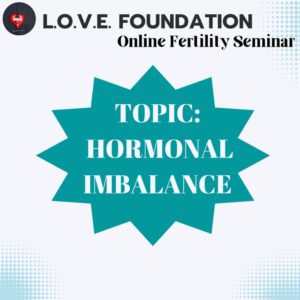HORMONAL IMBALANCE is a very sensitive topic as it affects a lot of people especially in our time and is a leading cause of infertility.
Statistics show that 42.9% of cases of infertility is traceable to hormonal imbalance. This is a staggering figure!!!
This is not a medical class so I won’t bore you with a lot of medical jargons.
First, we will have an overview of what hormones are and how they function.
Hormones are chemical substances produced in the body which act like messengers to stimulate specific cells or tissues into action, controlling how cells or organs do their work.
The two major groups of hormones are
▪️Water soluble hormones (peptide hormones) and
▪️Fat soluble hormones (steroid hormones).
There are 4 classes of hormones classified according to their site of function:
⭕ Autocrine hormones-they function in cells that produce them
⭕ Paracrine hormones- function in cells close to the area where they are produced
⭕ Intracrine hormones- functions inside of target cells
⭕ Endocrine hormones- produced in an organ and carried in the blood to cause an effect in another organ or cell.
All hormones are produced in organs called the endocrine glands.
Examples of endocrine glands are:
• Hypothalamus: It controls the body temperature, regulates emotions, hunger, thirst, sleep, moods and allow the production of hormones.
•Pineal gland: also known as the thalamus. It produces melatonin, which affects sleep patterns.
•Parathyroid: This gland helps in controlling the amount of calcium present in the body.
•Thymus: It helps in the functioning of the immune system
Thyroid: It produces hormones that affect the heart rate and how calories are burnt.
•Adrenal: This gland produces the hormones that control the sex drive, cortisol and stress hormone.
•Pituitary: It is also termed as the “master control gland,”. This is because the pituitary gland helps in controlling other glands. Moreover, it develops the hormones that trigger growth and development.
•Pancreas: This gland is involved in the production of insulin hormones, which plays a crucial role in maintaining blood sugar levels.
•Testes: In men, the testes secrete the male sex hormone, testosterone. It also produces sperm.
•Ovaries: In the female reproductive system, the ovaries release estrogen, progesterone, testosterone and other female sex hormones.
All these glands work together to produce and manage the hormones of the body which as you can see, in turn controls all the activities of the body. HORMONES ARE VITAL TO LIFE!
Hormonal diseases therefore occurs when there is a malfunctioning of the endocrine glands causing a disruption of this fine order.
An increase or decrease in the secretion of these hormones can severely affect growth, metabolism and development.
The factors responsible for hormonal diseases can be genetic, environmental, or related to diet.
COMMON SYMPTOMS OF HORMOMAL IMBALANCE INCLUDES:
•weight gain •hump of fat between the shoulders •unexplained and sometimes sudden weight loss •fatigue •muscle weakness •muscle aches, tenderness, and stiffness •pain, stiffness, or swelling in your joints •increased or decreased heart rate •sweating •increased sensitivity to cold or heat •constipation or more frequent bowel movements •frequent urination •increased thirst •increased hunger •decreased sex drive •depression •nervousness, anxiety, or irritability •blurred vision
•infertility •thinning hair or fine, brittle hair •dry skin •puffy face •rounded face •purple or pink stretch marks
These are not absolute symptoms of only Hormonal imbalance, but it is one of the factors to be considered when these symptoms are present.
When these symptoms are present and persist without any explanation, it is best to talk with your doctor to rule out the possibility of a hormonal imbalance
When you have a hormonal imbalance, you have too much or too little of a certain hormone. Even tiny changes can have serious effects throughout your whole body.
Think of hormones like a cake recipe. Too much or too little of any one ingredient affects the final product.
Some hormone levels fluctuate throughout your lifetime and may just be the result of natural aging. But other changes occur when your endocrine glands get the recipe wrong.
Your hormones play an integral role in your overall health. As a result, there’s a broad range of signs and symptoms that could signal a hormonal imbalance. Your signs or symptoms will depend on which hormones or glands are not working properly.
Hormonal conditions can affect people of all genders and even young people around the age of puberty. The condition could cause any of the signs or symptoms mentioned above.
Hormonal cycle also changes naturally during these stages:
puberty
pregnancy
breastfeeding
menopause(in elderly women) and andropause(in elderly men).
So we can comfortably say that hormones can be defective in three ways;
▪️Insufficient: produced in small quantities maybe due to genetic problems
▪️Suppressed: produced in normal quantities, but the over production of some other hormones prevents it from functioning normally.
▪️Unavailable: produced in normal quantities but not available to function due to the presence of some pollutants in the blood.
HORMONAL IMBALANCE AND INFERTILITY:
This is the aspect we are interested in.
Hormonal Imbalance is one of the leading causes of infertility. We have said that 49.2% of cases of infertility in females is due to hormonal imbalance.
We have said hormones can be;
▪️Insufficient: for infertility, hormonal insufficiency causes a defect in function in that hormone and can bring about a myriad of symptoms eg low progesterone causing repeated miscarriages, low estrogen, FSH and LH causing lack of ovulation, etc. Replacing the deficit hormones usually resolves the issue.
▪️Suppressed: Here, over production of certain hormones suppresses the reproductive hormones, stopping their function. E.g excess thyroid hormones suppressing all Reproductive hormones, excess testosterone in females suppressing female sex hormones and causing male-like features in women, excess estrogen in men suppressing male hormones and causing female-like features, high prolactin level stopping ovulation, etc.
Remember our table? Any disruption in that balance by increase or decrease of any hormone tilts that balance. Any little tilt can affect the entire body.
▪️Unavailable: here reproductive hormones are available, produced in their normal quantity by the body, but are unable to function because of pollutants that are called EDCs. These block the receptor cells of hormones and prevent them from binding to their receptors to carry out their functions.
If the pollutants are so many in the body, they can overshadow the hormones, block the receptors and cause problems.
This is the reason why sometimes, hormonal assay test is normal, yet a person’s Reproductive system is not functioning properly (it might not be village people😂😂😂). This happens in our body everyday.
When the fertility hormones are imbalanced in the body, some of the symptoms are:
Symptoms of a hormonal imbalance specific to females:
▪️Heavy or irregular periods, including missed periods, stopped periods, or frequent periods
▪️Hirsutism, or excessive hair on the face, chin, or other parts of the body
▪️Acne on the face, chest, or upper back
▪️Hair loss
▪️Hyperpigmentation(excessive darkening or difference in color from other body parts), especially along neck creases, in the groin, and underneath the breasts
▪️Skin tags
▪️Vaginal dryness
▪️Vaginal atrophy
▪️Pain during sex
▪️Night sweats
▪️Headaches
Symptoms of Hormonal Imbalance specific to males:
▪️Gynecomastia, or the development of breast tissue
▪️Breast tenderness
▪️Erectile dysfunction (ED)
▪️Decrease in beard growth and body hair growth
▪️Loss of muscle mass
▪️Loss of bone mass, otherwise known as osteoporosis
▪️Difficulty concentrating
▪️Hot flashes
Symptoms of Hormonal Imbalance to look out for in growing children attaining the age of puberty include:
▪️Lack of development of muscle mass in boys
▪️A voice that doesn’t deepen in boys
▪️Body hair that grows sparsely in boys
▪️Impaired penis and testicular growth in boys
▪️Excessive growth of the arms and legs in relation to the trunk of the body in both sexes
▪️Gynecomastia in boys
▪️Menstruation that doesn’t begin early (>16 years) in girls
▪️Breast tissue that isn’t developing in girls (> 15years).
COMMON CAUSES OF HORMONAL IMBALANCE INCLUDE:
▪️Hormone therapy: taking hormonal drugs indiscriminately like birth control pills
▪️Some Medications lime anti cancer drugs
▪️Cancer treatments such as chemotherapy
▪️Tumors, whether cancerous or benign
▪️Pituitary tumors
▪️Eating disorders particularly eating high cholesterol or carbohydrate based foods
▪️Stress
▪️Trauma
So generally,
▪️Genetic disorders can predispose a person to producing too little or too much of a particular hormone. If hormones are too little, they cannot carry out their function of regulation. If produced in excess, they can affect the functions of other hormones.
▪️Environmental and dietary factors can predispose one to also producing excess hormones or can create a situation where toxic materials present in the body affect the functions of the hormones in the body.
INVESTIGATION FOR HORMONAL IMBALANCE
The only test that detects hormonal imbalance is the hormonal assay and can be done by both men and women, even children if suspected.
Hormones that can be tested for fertility include:
▪️Follicle Stimulating Hormone (can be done on day 2 or 3 of the cycle in women)
▪️ Leutenizing Hormone(can be done on day 2 or 3 of the cycle in women)
▪️ Estrogen(can be done on day 2 or 3 of the cycle in women)
▪️ Progesterone(is done on day 21of the cycle in women)
▪️ Prolactin(can be done any day in the cycle for women)
These are also done in men and can be done any day in men.
Others are
▪️ Thyroid Hormone
▪️Testosterone
▪️ Anti Mullerian Hormone
TREATMENT OF HORMONAL IMBALANCE
Depends mostly on the cause. The most important thing is finding out the cause of the imbalance.
▪️If due to genetic insufficiency, treatment is hormonal replacement
▪️If due to suppression by other hormones, the excess hormone is suppressed by drugs and probably lifestyle
▪️ If due to pollutants, lifestyle modifications, detoxification and taking supplements can help correct it.
This brings us to the end of this lecture. Questions and contributions will be entertained in the comments section.



Leave A Comment